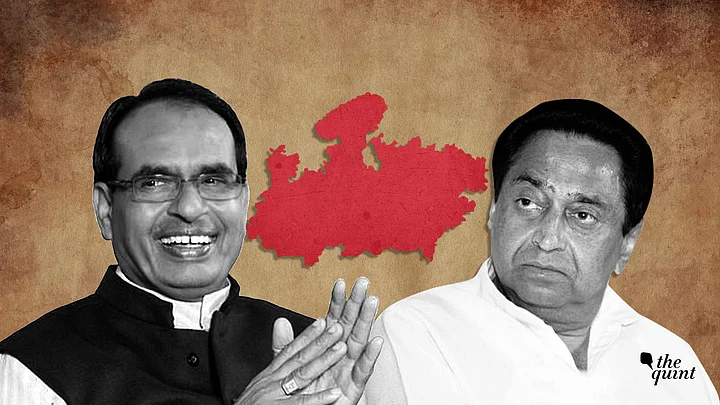The Bharatiya Janata Party (BJP) in a surprise move declared candidates for 39 seats in Madhya Pradesh (MP) and 21 in Chhattisgarh (CG) last week.
The Bharatiya Rashtriya Samithi (BRS) of K Chandrasekhar Rao has also declared candidates for all seats barring four in Telangana (TG).
A puzzling move to decipher, with polls at least 3 months away, and dates not yet been announced by the Election Commission of India. In two of these states, MP and TG, the ruling party has released the candidate list while in CG, BJP is the main opposition party.
The 2018 State Elections
In previous elections in 2018, BJP released its first list of candidates 3 weeks before polling day in CG and around 4 weeks before polling day in MP. In comparison to the date the elections were announced, CG list came 15 days after while MP list just about a month later.
TG is a special case, KCR had announced the dissolution of assembly in September 2018 demanding early polls. In anticipation of early polls, he had declared candidates around the same time. However, this time he has announced candidates without seeking dissolution of the house.
The Presidential Style of Campaigning
The obvious plan is to stump the opposition and take them off guard.
Also, parties realize that late announcement of candidates may kill their chances especially when a party has been in power for a long time like in TG and MP as anti-incumbency kicks in.
Ruling parties also have many ticket seekers for seats and early announcement doesn’t let build false hope among competitors. It also gives candidates time for campaigning and settling dissidence if any.
Also, any campaign expenditure incurred before the model code of conduct is enforced is not included in the candidate's account. Like any strategy, this could also go wrong. Late announcement doesn’t give a lot of time for dissidents to react and plot against the party. In this case, they get ample time.
It's baffling why a party like BJP/BRS which is increasingly contesting elections in a Presidential style and seeking votes in the name of leadership, Narendra Modi plus Shivraj Singh Chauhan (in case of MP and CG) and K Chandrasekhar Rao (in case of TG), has had this change of heart and given so much importance to the candidate
These parties have been boasting that Modi and KCR win elections for them. In a rally in Solan in Himachal last year, as per Indian Express, Modi said:
“Aur yaad rakhiye, hamara Bharatiya Janata Party ka umeedwar kaun hai? Aap ko kisi ko yaad rakhne ki zaroorat nahin hai, sirf kamal ka phool yaad rakhiye. Main aap ke paas kamal ka phool leke aaya hoon (“If you see ‘kamal ka phool’ while casting your vote, understand that this is the BJP, this is Modi who has come to you. Your every vote for ‘kamal ka phool’ will come directly to Modi’s account as a blessing”).PM Modi, as quoted in the Indian Express
While the Modi factor clearly works for the BJP in national elections, it can’t be said for the state elections, for example it couldn’t bail out the BJP in Himachal and Karnataka recently.
The party realizes that in a state election, the local candidate matters a lot. In terms of the hierarchy of elections, at the highest level, the role of leadership is more compared to the local candidate.
As per the Axis My India exit poll for 2019, for 37 percent of the respondents, the prime ministerial candidate was the most important factor, while 25 percent voted on the basis of the local candidate and 22 percent on the basis of party.
As we move down the hierarchy the role of the local candidate gains importance. At the lowest level like say sarpanch elections at the panchayat level, the role of the candidate is paramount.
How Important are Personality Cults?
In the 2018 state elections, the voting on the basis of CM candidate in four states, was very less compared to PM candidate in Lok Sabha. An average of Rajasthan, MP, CG, and TG, shows a tad less 21 percent of people voted on the basis of CM/PM face, 35 percent on the basis of party and the highest 39 percent on the basis of local candidate.
This means that on average 75 percent (three-fourths of voters) are voting either on the basis of local candidate or party symbol (composed of loyal voters) and not leadership in state polls.
While there is a lot of media hype around personality cults and how state elections in India are becoming increasingly Presidential style just like general elections, data doesn’t prove so.
Parties also seem to be realizing this and the focus is now back on the local candidate. The image of a local candidate, work done by him/her, his/her caste, etc. is some of the factors that play a key role in determining who wins from the Vidhan Sabha seat.
Announcing tickets early sort of indicates that both BJP and BRS accept that this time it could be a seat by seat contest in MP and TG. While BJP is battling almost a 20-year anti-incumbency, BRS in TG is battling a 10-year anti-incumbency.
BJP usually announces candidates late as votes are sought on the PM/CM name. A seat-by-seat contest is usually tough for the incumbent government/ruling party.
Surveys indicate a tight contest in MP while the race is getting closer in TG than earlier anticipated. Can the local candidates bail out, supplement the leadership factor in state elections. Only time will tell.
(The author is an independent political commentator and can be reached at @politicalbaaba. This is an opinion piece. The views expressed above are the author’s own. The Quint neither endorses nor is responsible for them.)
(At The Quint, we question everything. Play an active role in shaping our journalism by becoming a member today.)
